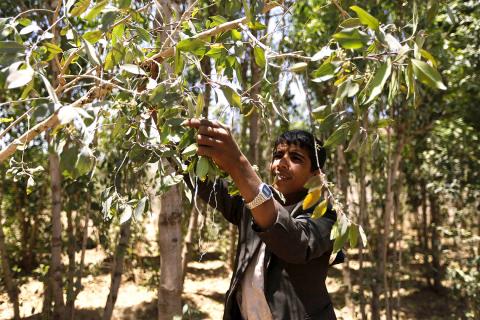Mountainous Yemen is blessed with more water than its Arabian desert neighbors, but the national passion for chewing the stimulant plant qat threatens to exhaust that precious resource.
In the mountains around the Yemeni capital, Sana’a, farmers are drilling so many unlicensed boreholes to irrigate the thirsty crop craved by the city’s residents that the water table is falling by as much as 6m a year. As a result, engineers now have to drill 1,500m in some areas before reaching the aquifer.
Qat is an evergreen shrub native to the Arabian Peninsula and the Horn of Africa, and chewing its leaves and shoots as a stimulant dates back centuries. Yet it is only in the past half century that its consumption has spread from the elite to become a focal point of Yemeni social and business life.

Photo: AFP
For Yemeni men, an afternoon chewing qat while decked out in traditional robes is an opportunity to cement social ties, seal business deals, or debate the issues of the day, and now increasing numbers of women and teenagers are also indulging in the habit.
Sales of qat in Yemen are estimated to run to US$800 million a year, a huge sum in a country ranked by the UN as 160th in the world for human development — the lowest in Asia bar war-torn Afghanistan.
Only 10,000 hectares were given over to cultivation of the crop in the 1970s, but by 2012 that figure had risen to 167,602 hectares, accounting for 12 percent of Yemen’s arable land.

Photo: Reuters
Its attraction to farmers is not difficult to understand. According to the Yemeni of Ministry Agriculture, qat can earn a planter US$12,500 a hectare, three times the revenue of any other crop. It takes five years to get a harvest from a fruit tree, but just a few months for a qat plant, and it can be harvested as many as four times a year.
However, each crop comes at a heavy cost in water usage since the plants are watered heavily for a month before harvesting to ensure that the tender leaves and shoots that users chew are as soft and moist as possible. One day’s supply of qat for a single user requires an estimated 500 liters of water to produce.
In Sana’a Province alone, there are 4,000 wells drilled without authorization to irrigate qat, water expert Omar Madhaji said. Excessive pumping is lowering the level of the water table by 3m to 6m annually, he warned.
Geologist Ismael al-Janad said that the Sana’a Basin aquifer is being drained at an unsustainable rate.
“The only alternative to the depletion of the water table is to take urgent measures to prohibit the use of water pumped from the aquifer for irrigation,” he added.
Yemeni Minister of Water Abdo Razaz Saleh acknowledged that the government had failed to stop unlicensed companies from digging deep wells, adding that 150 such companies operate in Sana’a alone, among 950 nationwide.
The upshot is that in a country that enjoys much higher rainfall that its mainly desert neighbor Saudi Arabia, mains water is heavily rationed, even for those who have it.
In Sana’a, a city of about 3 million people, only 45 percent of households have mains water and the taps are switched on just twice a week, water authority chief Ali al-Sarimi said.
Everyone else relies on privately owned boreholes.
“Most people in this area depend on the well,” resident Bashir Nashwan said as he queued at one Sana’a pumping station. “The water is provided by a generous donor, but it is always crowded and we have to queue for hours.”
Sarifi said just one-third of the 3 billion cubic metes of water that Yemen consumes each year comes from renewable sources. The rest comes from aquifers that have taken millions of years to form and cannot be replaced.

Taiwan Semiconductor Manufacturing Co (TSMC, 台積電) founder Morris Chang (張忠謀) yesterday said that Intel Corp would find itself in the same predicament as it did four years ago if its board does not come up with a core business strategy. Chang made the remarks in response to reporters’ questions about the ailing US chipmaker, once an archrival of TSMC, during a news conference in Taipei for the launch of the second volume of his autobiography. Intel unexpectedly announced the immediate retirement of former chief executive officer Pat Gelsinger last week, ending his nearly four-year tenure and ending his attempts to revive the

WORLD DOMINATION: TSMC’s lead over second-placed Samsung has grown as the latter faces increased Chinese competition and the end of clients’ product life cycles Taiwan Semiconductor Manufacturing Co (TSMC, 台積電) retained the No. 1 title in the global pure-play wafer foundry business in the third quarter of this year, seeing its market share growing to 64.9 percent to leave South Korea’s Samsung Electronics Co, the No. 2 supplier, further behind, Taipei-based TrendForce Corp (集邦科技) said in a report. TSMC posted US$23.53 billion in sales in the July-September period, up 13.0 percent from a quarter earlier, which boosted its market share to 64.9 percent, up from 62.3 percent in the second quarter, the report issued on Monday last week showed. TSMC benefited from the debut of flagship

A former ASML Holding NV employee is facing a lawsuit in the Netherlands over suspected theft of trade secrets, Dutch public broadcaster NOS said, in the latest breach of the maker of advanced chip-manufacturing equipment. The 43-year-old Russian engineer, who is suspected of stealing documents such as microchip manuals from ASML, is expected to appear at a court in Rotterdam today, NOS reported on Friday. He is accused of multiple violations of the sanctions legislation and has been given a 20-year entry ban by the Dutch government, the report said. The Dutch company makes machines needed to produce high-end chips that power

Taiwan would remain in the same international network for carrying out cross-border payments and would not be marginalized on the world stage, despite jostling among international powers, central bank Governor Yang Chin-long (楊金龍) said yesterday. Yang made the remarks during a speech at an annual event organized by Financial Information Service Co (財金資訊), which oversees Taiwan’s banking, payment and settlement systems. “The US dollar will remain the world’s major cross-border payment tool, given its high liquidity, legality and safe-haven status,” Yang said. Russia is pushing for a new cross-border payment system and highlighted the issue during a BRICS summit in October. The existing system